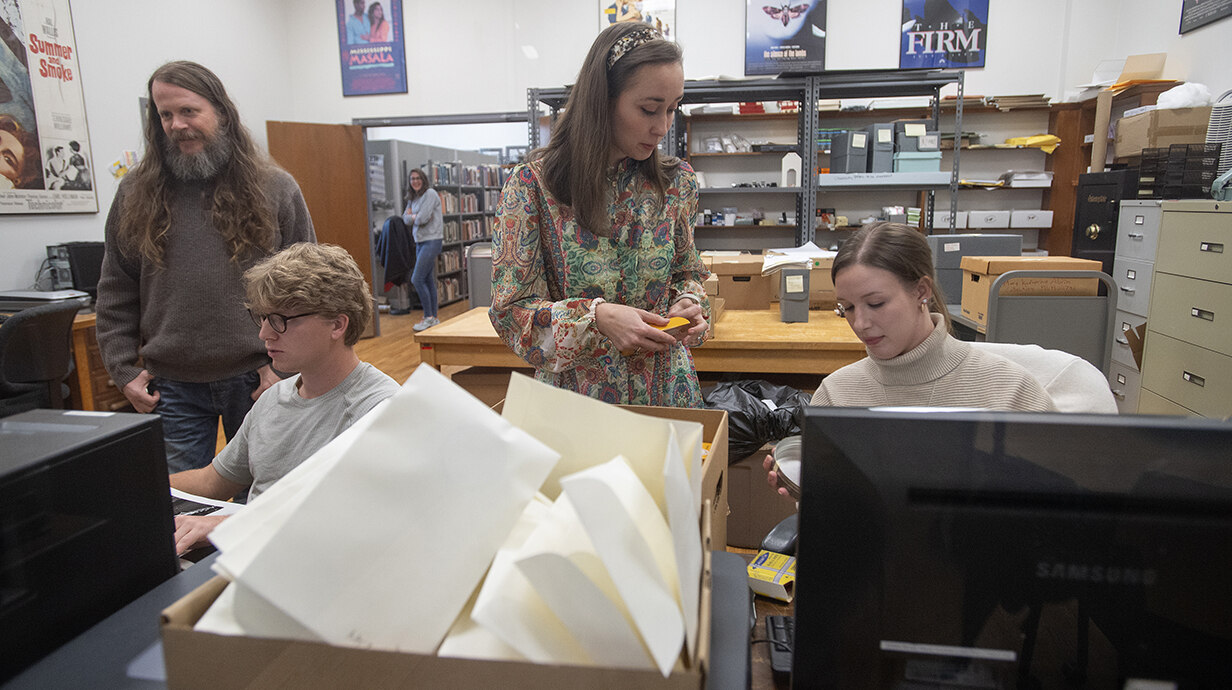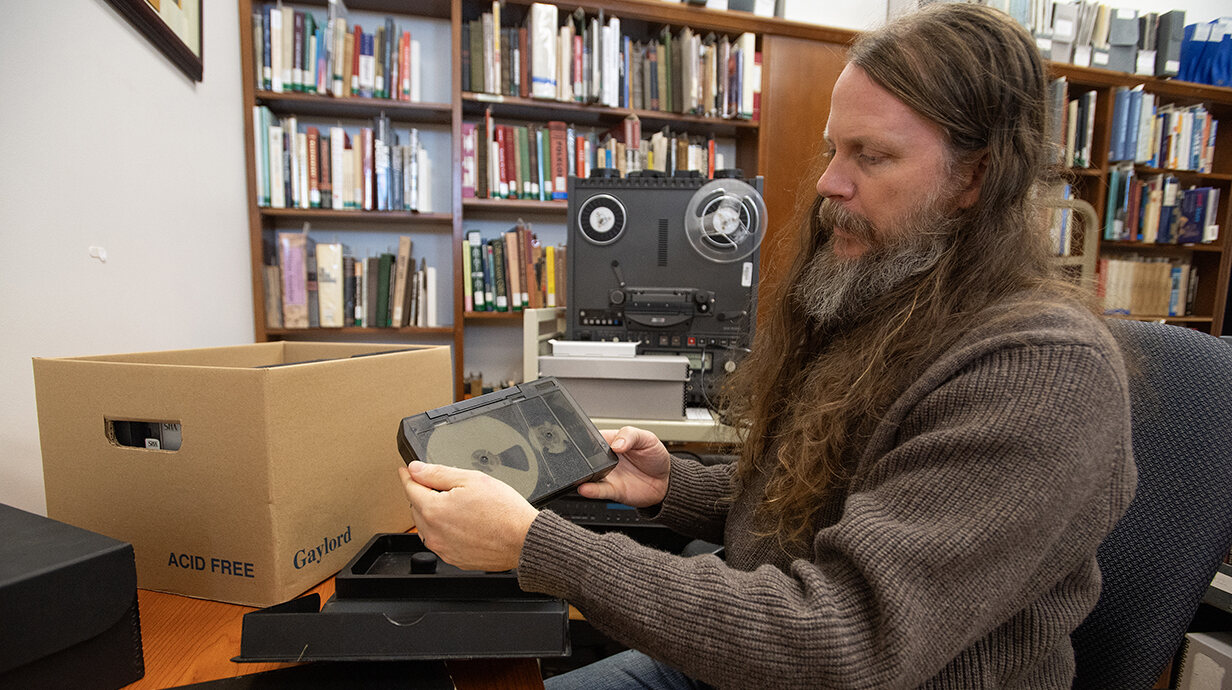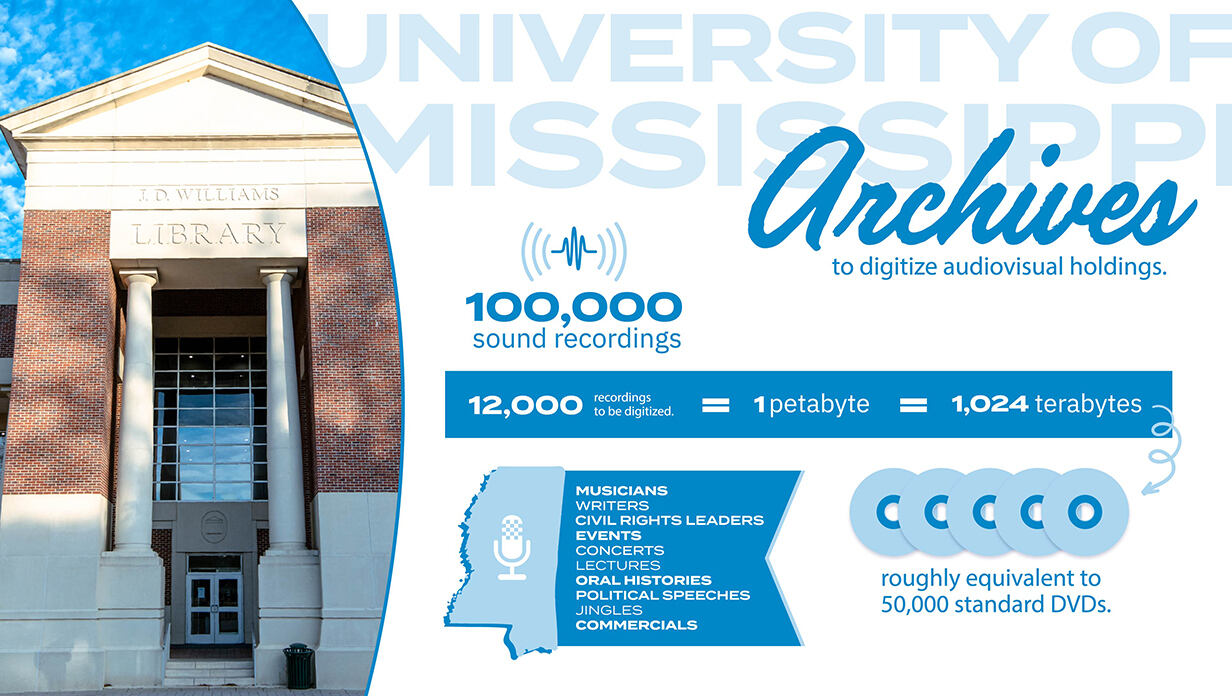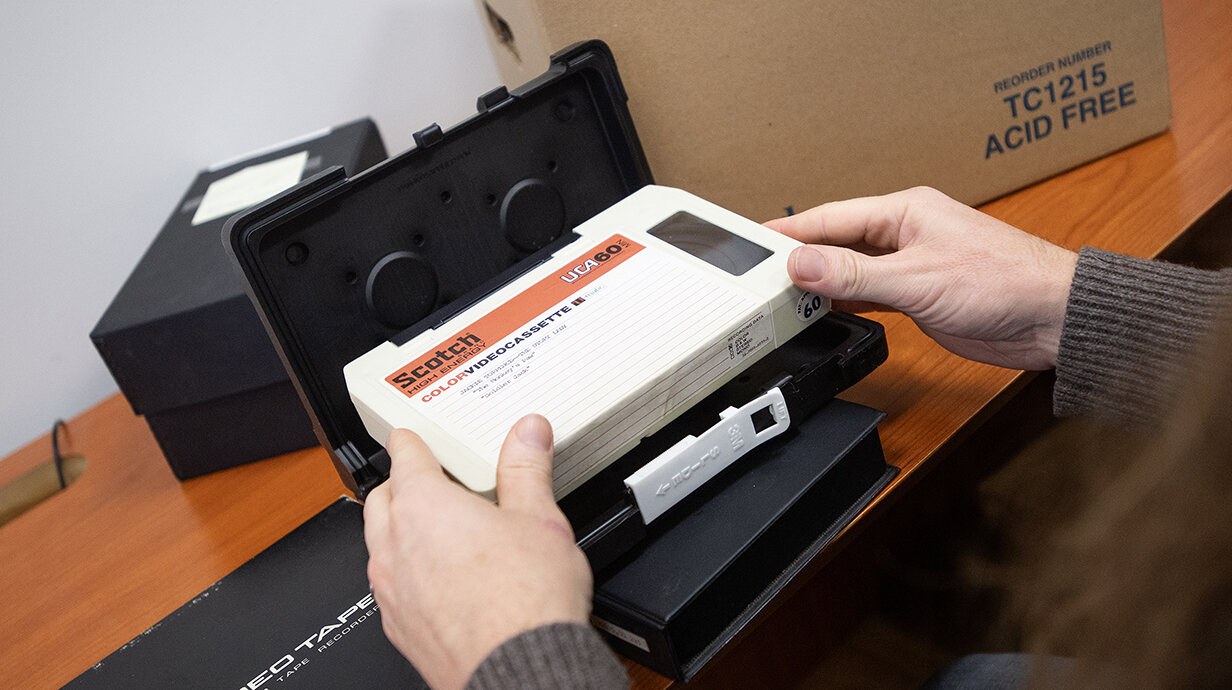Many recordings will be available on university’s eGrove repository
 MARCH 15, 2024 BY BENITA WHITEHORN
MARCH 15, 2024 BY BENITA WHITEHORN
Audiovisual holdings in the University of Mississippi’s Department of Archives and Special Collections will be modernized and gain audiences worldwide through a new digitization project.
“Here in Archives and Special Collections, we have so many rich resources related to Mississippi and the American South,” said Greg Johnson, head of the department. “These materials have been accessible to people (but) because of the nature of the fragility of certain audiovisual formats, a lot of those have just not been able to be played.”
With support from the National Historical Publications and Records Commission, “We’re going to be able to make these rich resources related to the history of Mississippi, the blues, the Civil Rights Movement and much more accessible to researchers around the world,” Johnson said.
A number of the recordings focus on civil rights, including various speeches given by James Silver, author of “Mississippi: The Closed Society,” presentations from different civil rights conferences and oral history interviews with civil rights leaders.
Recordings also document many presentations over the years, such as the Faulkner Conference and Oxford Conference for the Book, and include interviews with and about Mississippi musicians and writers; concerts and lectures; political speeches and jingles; and commercials. Films document various Southern folk traditions, from fiber arts to dance to storytelling.

Greg Johnson, head of the Department of Archives and Special Collections, examines a videotape to be digitized as part of a project to make the archive’s materials more accessible to researchers and the public. Photo by Thomas Graning/Ole Miss Digital Imaging Services
The department houses almost 100,000 sound recordings, most of which are commercially produced and controlled by copyright. Of that total, almost 12,000 recordings will be digitized, which Johnson reckons will add up to a petabyte, or 1,024 terabytes of data, roughly equivalent to 50,000 standard DVDs.
The audiovisual materials come in many formats, such as 16 mm film, Super 8 film, 8 mm film, Betacam, U-Matic, VHS, digital audio tapes, microcassettes, audio cassettes and 16 2/3 rpm discs, some dating back more than 50 years.
“The cost of digitizing these older formats can be quite expensive,” Johnson said. “Many of them need very specific care from audiovisual recording engineers.”
Katherine Tutor, project coordinator for the initiative, agreed that the most rewarding aspect of this project will be the increased accessibility of the university’s audiovisual collections.
“Certain materials are in technologically obsolete formats and are therefore underutilized,” said Tutor, who earned a master’s degree in English literature from Ole Miss in 2020. “I’m excited to see the information on these reels and tapes take on new life as researchers across the world access insights related to literary figures, blues musicians, modern political events, Mississippi folkways, among many other subjects.”
Two graduate assistants, Erica Howard and Albie Chatfield, are numbering and cataloging each item, as well as creating metadata to describe the content. After the items go to an outside vendor for digitization, the students will check for quality control, add more metadata to make the items discoverable and searchable, and edit out extraneous material, such as a soap opera that was recorded on the same tape as an interview.
“A challenge I have run into during this project is the identification of materials which I was unfamiliar with before,” said Howard, who is pursuing a master’s degree in communication sciences and disorders. “Because the majority of the materials we handle in the project were born decades before I was, this has been my first time seeing them in real time.”
Archivists, with the help of an outside vendor, will add transcripts of the audiovisual materials to make them accessible and compliant with the Americans with Disabilities Act.
 At the end of the project, they plan to upload many of the items to eGrove, the university’s institutional repository. Also, they are planning an interactive digital display for the J.D. Williams Library to highlight the digitized audiovisual content.
At the end of the project, they plan to upload many of the items to eGrove, the university’s institutional repository. Also, they are planning an interactive digital display for the J.D. Williams Library to highlight the digitized audiovisual content.
In addition to the digitized master recordings, edited access copies can improve some recordings where audio levels are low, or there’s a crackle, hiss or persistent hum, such as from an air conditioner.
Lower-resolution, but still high-quality, digital recordings will go on eGrove, but researchers can request a copy of the master preservation file at the highest quality. Those files are so big that it would take too long to load and access online, Johnson said.
“With these rich resources, we’re always contacted by documentary filmmakers, (or) authors working on a book or magazine, wanting to access collections for those,” he said. “So, I imagine when we get a lot of this film – like the 16 mm film digitized, for instance – I think a lot of that is really going to open up pathways for filmmakers getting access to a lot of really rich content.”
For example, the archive digitized a collection several years ago that had been shot on 16 mm film in 1941 by Emma Knowlton Lytle, documenting life on a plantation in the Mississippi Delta, Johnson said.

Many of the archival videocassettes to be digitized as part of the project are decades old. Photo by Thomas Graning/Ole Miss Digital Imaging Services
“There’s film of people picking cotton on the plantation by hand,” he said. “You can see people plowing with mules, but also see the onset of mechanization, using tractors.
“That footage has been used by a number of documentary filmmakers, people looking at civil rights, sharecropping, and that footage is really valuable for things like that.”
Among the material to be digitized are master recordings from the Trumpet Records Collection, which will draw researchers’ interest, Johnson said.
An independent label in Jackson in the 1950s, Trumpet records was founded by Lillian McMurry, who wanted to record undiscovered blues artists from the Delta.
“She was the first person to record Sonny Boy Williamson II, Elmore James and some others,” Johnson said. “And she donated all of her business files, including a lot of master tapes and things, to us.”
Johnson said many musical traditions are documented in these collections, from blues and gospel, to mountain dulcimer and fiddle, to shape note singing and Scottish ballads, to jazz and classical. Different dance traditions are also featured on these recordings, including Native American dances and square dancing.
While the task of digitizing hours and hours of audiovisual recordings is daunting, Tutor said it’s well worth it.
“Perhaps the greatest challenge of this project will be the sheer volume of materials to be converted, but the scholarly payoff will far surpass any obstacles,” she said.